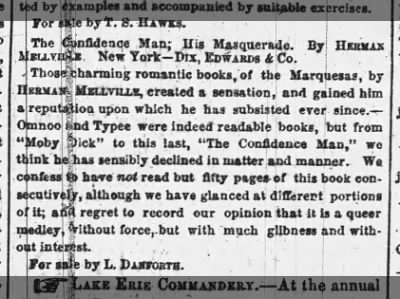 |
| William Erigena Robinson Mathew Benjamin Brady, Public domain, via Wikimedia Commons |
Some of the literary articles of the Review are exceedingly well done. The criticism of Melville's Omoo, is written in a healthy moral tone, and displays much intellectual acumen. Melville's works have acquired a good deal of popularity, but most undeservedly, as we apprehend. Their tendency is immoral, in the highest degree, and we are glad that this fact has been demonstrated by the Review.Found on Newspapers.com
There is neither truth, earnestness, nor heart, in any thing he has ever published. Pleasant reading enough, both Typee and Omoo, if we could be rid of the idea that the writer was sneering, false and vicious—a mere sensualist, boasting all the time, by intimations of his uninterrupted successes with the savage maidens. We are not disposed to believe him so profligate as he represents himself. Such a combination as a licentious man, vaunting his triumphs over female purity, whether savage or civilised, rarely occurs. The wretches in society who destroy female reputation, are not the wretches to do any other mischief.
Who edited the Morning Express in Buffalo, New York?
"Published every morning by A. M. Clapp & Co."That would be Almon Mason Clapp, the man who founded the Buffalo Express in 1846. According to the section on "The Newspaper Press" in A History of Buffalo, the first editor of the Buffalo Morning Express was James McKay. But Mckay was
"succeeded in the fall of '46 by W. E. Robinson, formerly of the New York Tribune; so that the Express was referred to by some of its contemporaries as ‘‘a branch of the New York Tribune. --The Periodical Press of Buffalo - Publications of the Buffalo Historical SocietyWilliam Erigena Robinson, aka "Richelieu," had been Greeley's editorial assistant and Washington correspondent.
Greeley associate and new editor of the Buffalo Morning Express William E. Robinson might be the writer who favorably noticed Peck's unfavorable review of Omoo. The dim view of Omoo echoes influential comments Greeley himself had made in a hit piece that was published in the Weekly Tribune on June 26, 1847. Those bad notices by Greeley and Peck revealed, as Hershel Parker shows in a gem of reception history, that:
"Typee had made Melville the first American author to become a sex symbol."In 1852 A. M. Clapp "took the editorial direction of the paper on himself," again according to the History of Buffalo. So then, Almon Mason Clapp could be the Buffalo editor who looked into The Confidence-Man ten years later, and did not like it:
--Herman Melville: A Biography, Volume 1 (Baltimore and London: The Johns Hopkins University Press, 1996), 530.
The Confidence Man; His Masquerade. By HERMAN MELVILLE. New York—DIX, EDWARDS & CO.
Those charming romantic books, of the Marquesas, by HERMAN MELLVILLE, created a sensation, and gained him a reputation upon which he has subsisted ever since.— Omnoo and Typee were indeed readable books, but from "Moby Dick" to this last, "The Confidence Man," we think he has sensibly declined in matter and manner. We confess to have not read but fifty pages of this book consecutively, although we have glanced at different portions of it; and regret to record our opinion that it is a queer medley, without force, but with much glibness and without interest.
For sale by L. DANFORTH. --Buffalo Morning Express, April 8, 1857.


No comments:
Post a Comment